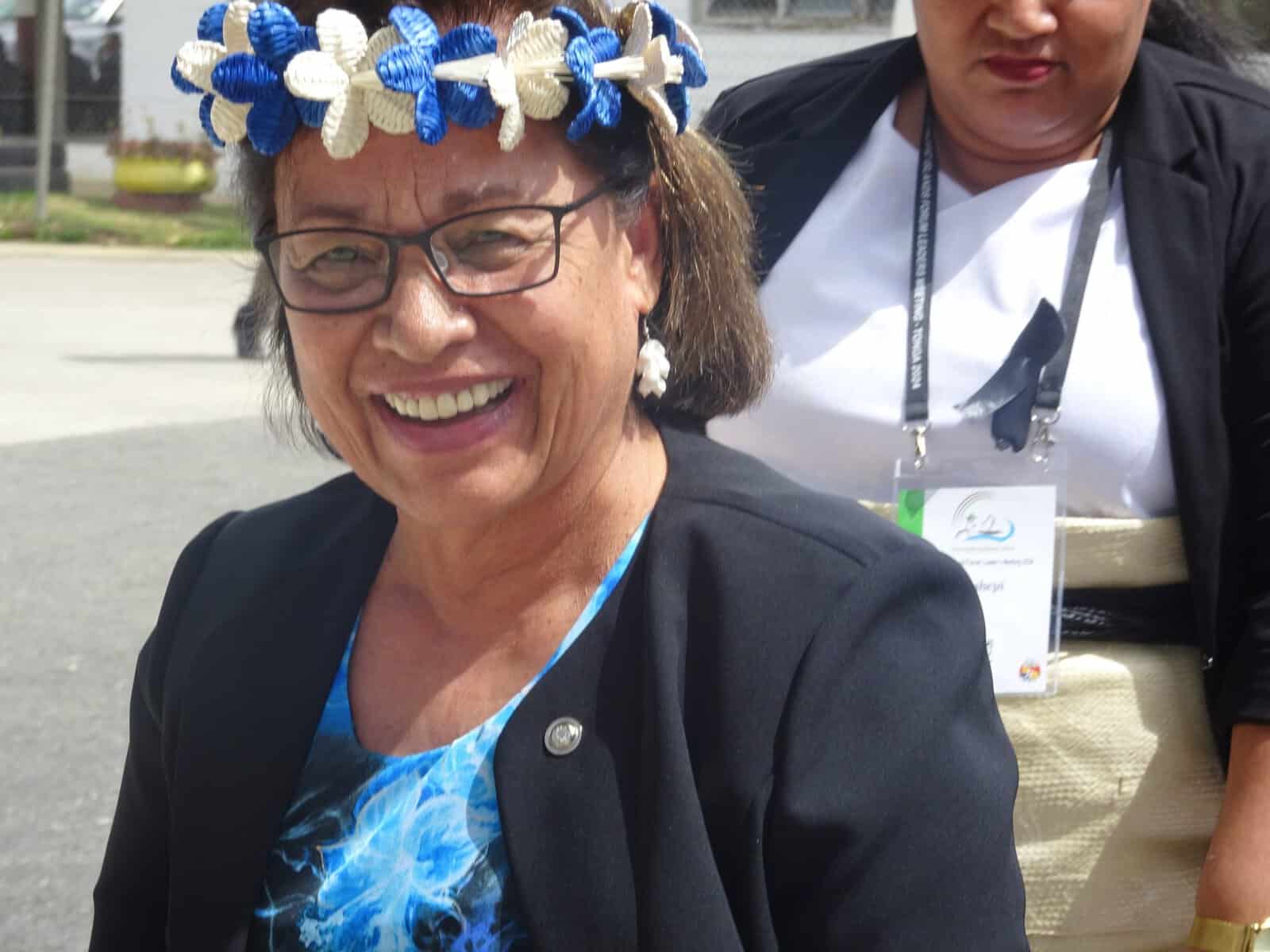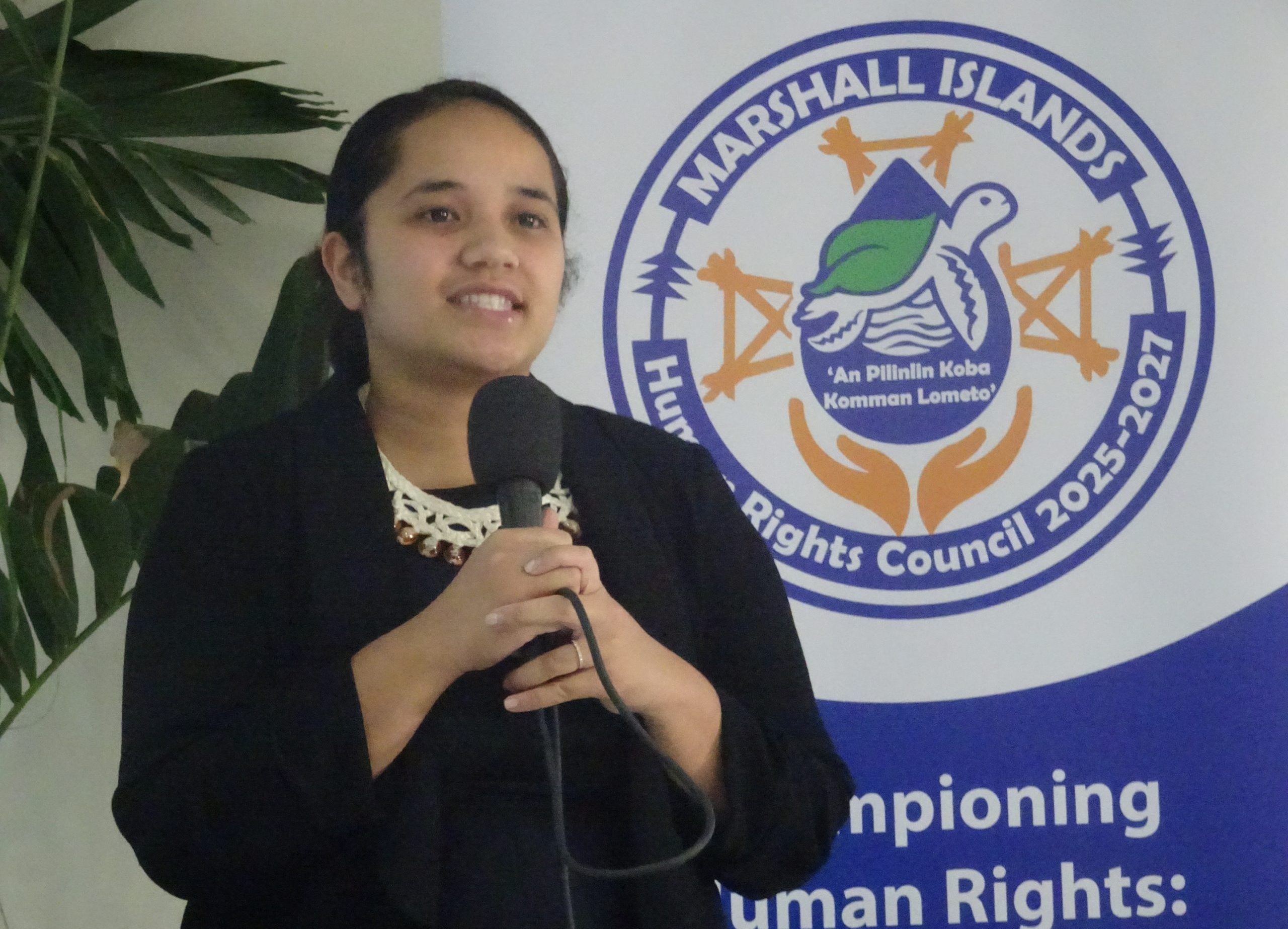For twelve years after the Second World War, the United States conducted 67 nuclear tests on Bikini and Enewetak atolls in the Marshall Islands. Today, the government and people of the Republic of the Marshall Islands (RMI) want regional and international support to address the nuclear legacies of that era.
As she joined other Pacific leaders in the Kingdom of Tonga this week for the 53rd Pacific Islands Forum, RMI President Dr. Hilda C. Heine said the hazards of the nuclear era began in her childhood.
“When I was just a young girl, our islands were turned into a big laboratory for weapons of mass destruction, biological warfare agents and unexploded ordinance,” Heine said. “The impacts are not just historical facts, but contemporary challenges.”
Joining representatives of the United Nations Office of the High Commissioner for Human Rights (OHCHR), President Heine spoke to a public forum on Tuesday in Nuku’alofa, outlining an RMI initiative on nuclear legacies and human rights at the UN Human Rights Council.
She also linked the RMI experience to other island nations used as nuclear testing grounds. For fifty years in the second half of the 20th Century, the United States, United Kingdom and France conducted more than 315 atmospheric and underground tests at ten sites across Oceania, in Kiribati, French Polynesia and Australia as well as the Marshall Islands.
For the 18-member Pacific Islands Forum, responding to contemporary nuclear threats is also part of the Blue Pacific agenda of ocean protection, climate action and community development. From Japan’s ocean dumping of treated nuclear wastewater from the Fukushima nuclear reactor, to Australia’s planned purchase of nuclear submarines, there are many affected communities calling for recognition and reparations, better health care and environmental remediation.
This Thursday 29 August, the regional Presidents and Prime Ministers travel to the northern islands of Vava’u for their annual Forum leaders’ retreat. Symbolically, the United Nations has designated this date as the International Day Against Nuclear Tests.
Seizing the agenda
Just as Pacific climate justice activists chant “We are not drowning, we are fighting”, the Marshall Islands government is seeking to move beyond victimhood, with concrete initiatives to advance claims for compensation, recognition and remediation.
During her first term of office, President Heine created the RMI National Nuclear Commission (NNC) in 2017, to co-ordinate and expand efforts to address nuclear testing legacies. Elected for a second term earlier this year, Heine continues to highlight the nexus between climate change and nuclear contamination, worried that radioactivity will leach into the marine environment from the Runit Dome– a dumping ground for nuclear waste and materials built by the US government on Enewetak Atoll in the 1970s.
Beyond immediate health and environmental impacts, the Marshallese people face diverse cultural challenges that affect their human rights. At the public forum in Nuku’alofa, the RMI President stressed that “the displacement of communities from ancestral lands has resulted in grave cultural impacts, hindering traditional knowledge from being passed on to younger generations. Certain traditional practices, customs, ceremonies and even a defining our very identity becomes distant memories – memorialised through chants and storytelling.”
Last year, Ariana Tibon-Kilma was chosen as President of the National Nuclear Commission, reflecting the interest and involvement of a younger generation of Marshallese. Earlier this year, on the 70th anniversary of the Bravo nuclear test, Tibon-Kilma told Islands Business that the NNC was working to build awareness of nuclear history for young students.
“When the National Nuclear Commission was established and I started doing community outreach, the first question I asked was ‘how many bombs were tested’?” Tibon-Kilma said. “The NNC realised that there was a huge gap in knowledge, and we needed to have students learning more about this. There was no understanding that there was a history of displacement because the US had relocated communities.”
Supporting curriculum officers at the RMI Ministry of Education, the Pacific Community (SPC) has developed a curriculum for primary and secondary school students to learn about nuclear history, alongside other social issues such as gender equality and human rights. The pilot program has been trialled in 12 RMI primary and secondary schools, with plans to extend it to other schools.
Tibon-Kilma explained that the NNC also works to coordinate activities between government ministries, the College of the Marshall Islands (CMI) and agencies like the Environment Protection Agency. After years of being poked and prodded by researchers, academics and scientists, affected communities in Marshall Islands now seek to control this engagement: the NNC has adopted protocols requiring researchers to engage in ethical research, seek local permissions, conduct ethics reviews, and make written commitments on post-research data transfer.
Calls for compensation
Despite these initiatives, there are still many unaddressed impacts from the testing era.
As Presidential Envoy for Primary Care and Disease Prevention, Dr. Wilfred Alik is in Tonga this week with the RMI delegation. For Alik, the impacts of the 67 US nuclear tests in the 20th Century continue to be manifested in many different ways.
“The nuclear legacy is closely inter-twined with the history of the Marshallese people, and has changed the course of history for the Marshallese people,” he said. “It has not only changed the environmental landscape – it has political, social, medical and cultural implications.”
From the 1990s, the RMI Nuclear Claims Tribunal issued rulings worth US$2.3 billion for damage to health and property damage arising from the Bikini and Enewetak tests. However after RMI moved to self-government in 1986, a trust fund established for nuclear compensation was soon exhausted, leaving many unpaid claims. Despite a “Changed Circumstances petition” issued in 2000, which sought extra US funding for compensation, the US Congress has failed to fully address the ongoing financial shortfall. Beyond this, the revised US-RMI Compact of Free Association, signed in October last year, avoids any direct reference to nuclear legacies.
Frustrated by the delay and dysfunction of the US Congress, the RMI has expanded efforts to gain international support. As President Heine explained: “We are now working to reshape the narrative, from being victims to one of active agency, in helping to shape our own future and the world around us.”
Beyond regular outreach through the Micronesian Presidents’ Summit and the Pacific Islands Forum, the RMI government won a position on the United Nations Human Rights Council in 2019 – since then, it has worked to raise awareness on the way that nuclear legacies adversely affect human rights for the Marshallese people.
“Our pursuit of justice is one that’s grounded in human rights, born from the struggles of our people,” Heine said. “It is driven by our need for natural and environmental justice, where we must be heard – no longer ignored – and our grievances addressed. We are a unique and important moral compass in the global movement for nuclear disarmament and non-proliferation.”
RMI’s role on the UN Human Rights Council not only raised international awareness about the nexus of human rights and nuclear legacies, but also the need for greater technical assistance and capacity-building. In October 2022, the Human Rights Council adopted consensus resolution 51/35, requesting the United Nations High Commissioner for Human Rights to prepare a report on the human rights implications of nuclear testing in the Marshall Islands.
Mandated by this UN resolution, international law expert Raphael Pangalangan has led a team through a series of consultations with the RMI government, the US government, community representatives and UN agencies. Visiting Majuro last March, Islands Business witnessed the lengthy dialogue between the OHCHR team and government ministries, the NNC and affected communities, to gather diverse local perspectives.
The final report has been reviewed by both the US and RMI governments, and will be submitted in September in Geneva. Framed around the right to health, the right to a safe environment and other human rights, the report uses a transitional justice approach to detail “the challenges and barriers to the full realisation and enjoyment of human rights stemming from the nuclear legacy.”
Reverberations across the Pacific
Heike Alefsen is the Regional Representative of the Office of the UN High Commissioner for Human Rights (OHCHR) for the Pacific. Following the 2022 resolution of the Human Right Council, Ms. Alefsen believes that the new report’s recommendations will be taken up by many other countries beyond the Marshall Islands and the United States.
“We hope there will be reverberations beyond the two countries concerned, because it is an issue that affects the broader Pacific, and of course all members of the United Nations in some way,” she told Islands Business. “We do hope that the human rights implications of the nuclear legacy will get greater attention – we’ve had a lot of discussions on other impacts, but not that it has an impact on rights.”
“Because it is a mandated report, it’s a report that all countries in the Council should have an interest in – it was adopted by consensus,” she noted. “So we hope that there will be a very serious and constructive engagement around the impact on human rights of the Marshallese nuclear legacies.”
At the next meeting of the UN General Assembly in October, the Human Rights Council membership will be renewed for 2025 – 2027. RMI is seeking another term on the Council, and this week in Tonga, President Heine is seeking support for the RMI bid from fellow Forum members.
While stressing that the decision on membership was a matter for UN member countries, Alefsen said that the presence of Small Island Developing States on the Human Right Council brought new perspectives to the international body.
“The Pacific Islands have not had many representatives on the Human Rights Council, though we’ve seen great leadership by Fiji a few years ago,” she said. “Having a small island developing state like the Marshall Islands on the Council ensures diversity, ensures a focus on those that are the most vulnerable to human rights violations and who also have a particular expertise to bring into international discussions. We do hope that the participation of the Marshalls or other Pacific countries will facilitate discussion on different topics that other countries won’t focus on.”
Support from the Forum

Attending this week’s meeting in the Kingdom of Tonga, President Heine has also urged the Pacific Islands Forum “to prioritise the establishment of mechanisms to build capacity and capability, data collection and analysis, and link nuclear legacies to health and environmental impacts. This ensures that Pacific Island nations are fully informed to address these issues.”
“This is our call for action,” she said. “We also emphasise the need for regional solidarity in addressing not only historical injustices but also the ongoing challenges associated with nuclear testing.”
Forum Secretary General Baron Waqa joined the RMI panel to express support for action on nuclear threats in the region and praising “the important role of civil society and communities in advocating these issues.”
Acknowledging past work by the Nuclear Legacies Taskforce established by regional agencies, Waqa noted that “we are progressing a study on the status of nuclear contamination in our Blue Pacific continent. Through the Rarotonga Treaty consultative committee is advancing international co-operation, including collective co-operation on the Nuclear Non-Proliferation treaty, the Comprehensive Nuclear Test Ban Treaty as well as the Treaty on the Prohibition of Nuclear Weapons.”
Last year, just three days before Christmas, the UN General Assembly adopted a resolution designed to assist survivors of nuclear testing and restore environments contaminated by nuclear weapons testing.
Jointly developed by Kiribati and Kazakhstan, the resolution won overwhelming support, with 171 nations in favour, six abstentions and just four votes against. In a revealing action that undercuts their pledges of support to the region, France and Britain voted with Russia and North Korea to oppose assistance to people and landscapes irradiated during decades of nuclear testing. This work has a way to go.
